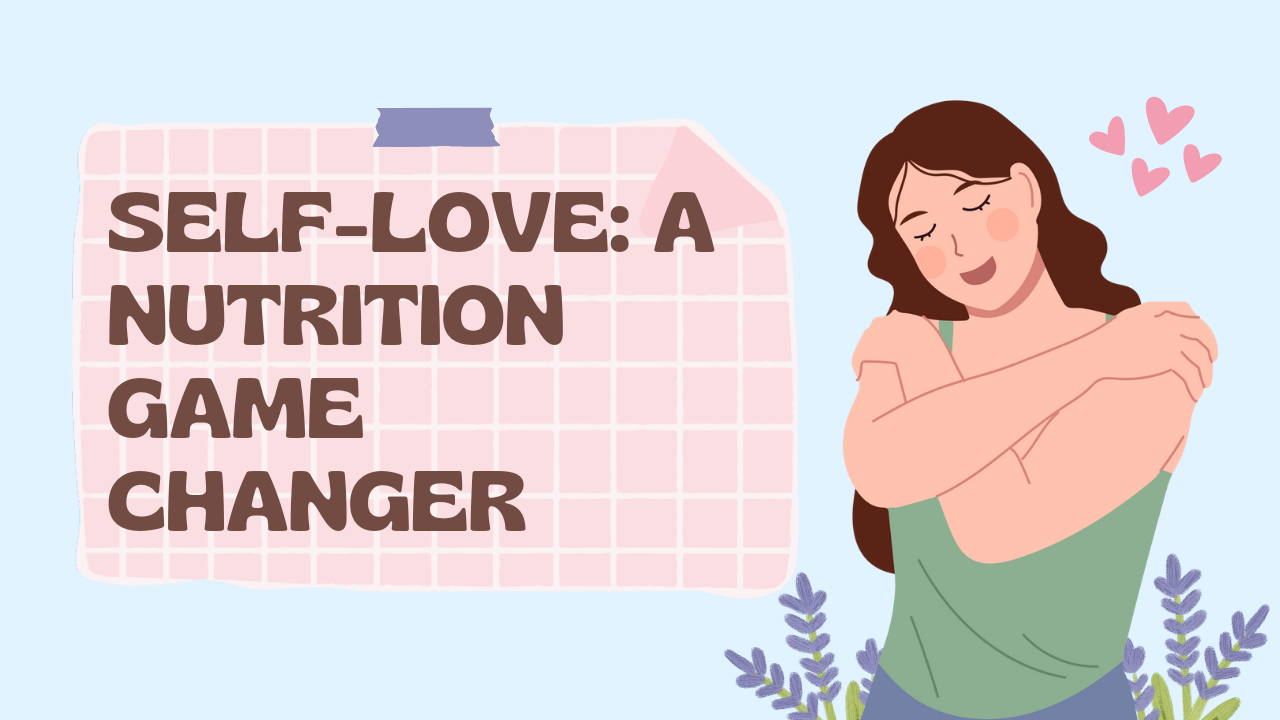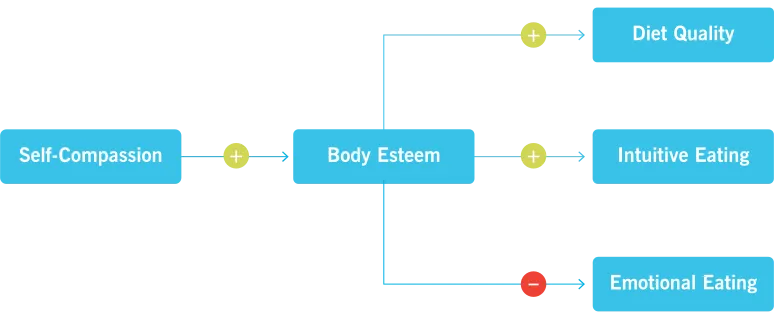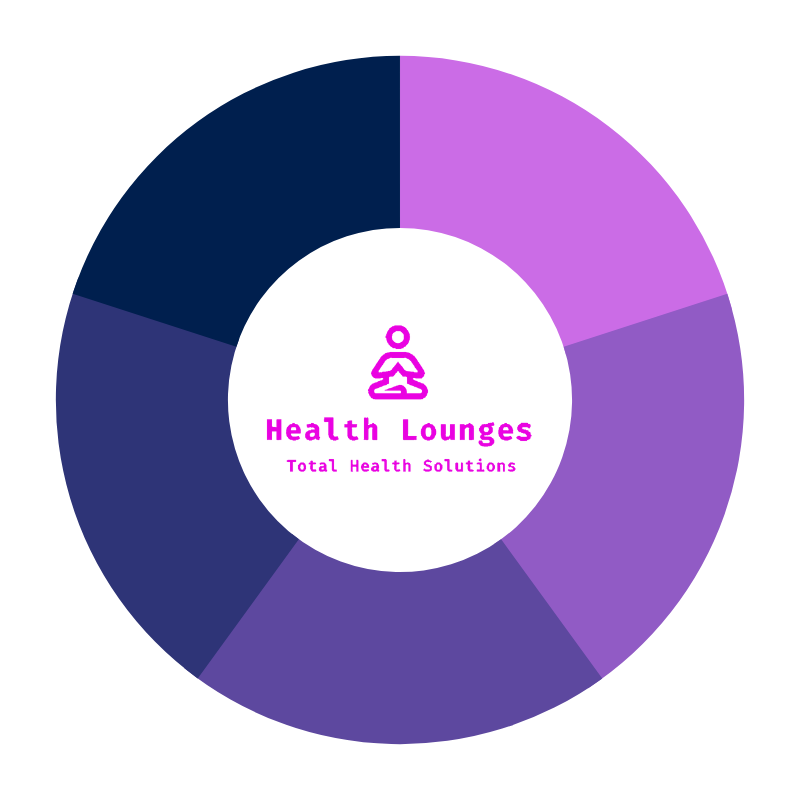Self-love: A nutrition game changer?

Some people think self-compassion is just fluff.
We get it.
Our clients probably come to us thinking they need advice on what to eat, not on how to be nicer to themselves.
Fair enough: It’s not always easy to see the link between self-compassion and nutrition habits.
But self-compassion is a cornerstone of our coaching program here at Health Lounges.
We’ve found it’s a game-changer in helping our clients eat, move, and live better and a study published in Nutrients helps explain why.
How the study worked
The researchers decided to look at the relationship between self-compassion, body image, and eating habits in mothers.
The researchers recruited 100 moms to fill out a series of online questionnaires about:
- Self-compassion (rating statements like: “When I’m going through a tough time, I give myself the caring and tenderness I need.”)
- Body esteem (rating statements like: “I like what I see when I look in the mirror.”)
- Diet quality (how much of their diet was made up of fresh fruits and vegetables, for example)
- Intuitive eating (rating statements like: “I trust my body to tell me when to eat.”)
- Emotional eating (rating statements like: “When I feel lonely, I console myself by eating.”)
The scientists then took all this information and statistically analyzed it to see if they could connect any dots.
Now, before we get to the results, you might be thinking to yourself,
‘This doesn’t sound like an exact science.’
And yep, you’d be right about that. All the data in this study is self-reported, which isn’t as strong as data collected by an experienced researcher doing an in-person interview with a study participant, for example.
At the same time, self-compassion is very tricky to study since it’s pretty subjective.
So while this study is by no means even close to perfect (and no study is), the results are pretty interesting.
What the study found
As the researchers predicted, moms who scored higher on self-compassion were more likely to have a healthier relationship with food.
Their diets were higher quality.
They were more likely to be intuitive eaters.
They were less likely to experience emotional eating.
But here’s what’s interesting: Mothers with higher levels of self-compassion were also found to have higher levels of body esteem.
And the researchers propose that a better image of one’s own body is what makes healthier eating behaviors possible.

This isn’t a novel idea.
Research has already established that liking your body is associated with healthy and intuitive eating habits.
But what’s new here is that self-compassion may be the catalyst for boosting body esteem and making healthier habits more likely.
Nerd Knowledge
Okay, but what does self-compassion mean?
There are three main components:
- Mindfulness: Being non-judgmentally and consciously aware of what you’re doing, thinking, feeling, and experiencing.
- Common humanity: Recognizing that we’re part of a greater whole, not an isolated individual with unusual problems.
- Self-kindness: Being generous and decent to yourself.
To put this into practice, let’s take emotional eating, for example.
Many mentally beat themselves up during and after going all out on a jumbo-size bag of pringles.
Practicing self-compassion in that situation might sound something like:
Mindfulness: “Oh, yep. I’m eating my feelings right now. This doesn’t feel super great, but I don’t feel like I can stop.”
Common humanity: “You know, this is a pretty understandable response to what I’m going through. Many people deal with emotional eating when they’re stressed, too.”
Self-kindness: “I’m going to be alright. I’ll start by taking a deep breath. Then I can decide what I do next, and whatever I decide to do will be okay.”
In the beginning, it can help you if you write these statements as you work through a challenging situation.
Eventually, as your self-compassion strengthens, you may notice these statements become part of your inner monologue.
Coaching Takeaways
1. Self-compassion delivers tangible results.
It’s easy to assume that being hard on ourselves will create change.
But we have evidence—from this study, others, and our experience coaching here at Health Lounges —that combining mindfulness, common humanity, and self-kindness can lead to a healthier relationship with food.
2. Self-compassion can be cultivated.
What if self-compassion isn’t precisely your second nature?
At least you will get a solid understanding of what self-compassion is and isn’t.
Because contrary to what some may think, it’s not being lazy, “soft,” or whiny.
For example, self-compassion DOESN’T mean you get a “Get out of jail free” card or not having any accountability.
It DOES mean taking a break at times and recognizing all the factors that lead to your choices (many of which you don’t control).
3. Self-compassion doesn’t have to be complicated.
It may seem challenging to cultivate self-compassion.
But research shows that small things can make us a bit nicer and even improve our eating habits.
Here’s one you can try with yourself :
Write yourself a letter that expresses kindness, compassion, and understanding about your weight and appearance.
Self Love is just one way to solve Nutrition problems. If you’d like to go even deeper and learn more strategies to help yourself Eat better and get the right coaching you genuinely deserve, check out our Recovery, Sleep and Stress Management Coaching Program. (The next session opens soon.)
Until next time,
Dt. Mohit Mittal
(BFND, B.TECH, DDHN, NSQF-4, YCB-3, SSY-1, PT- REPS INDIA)
